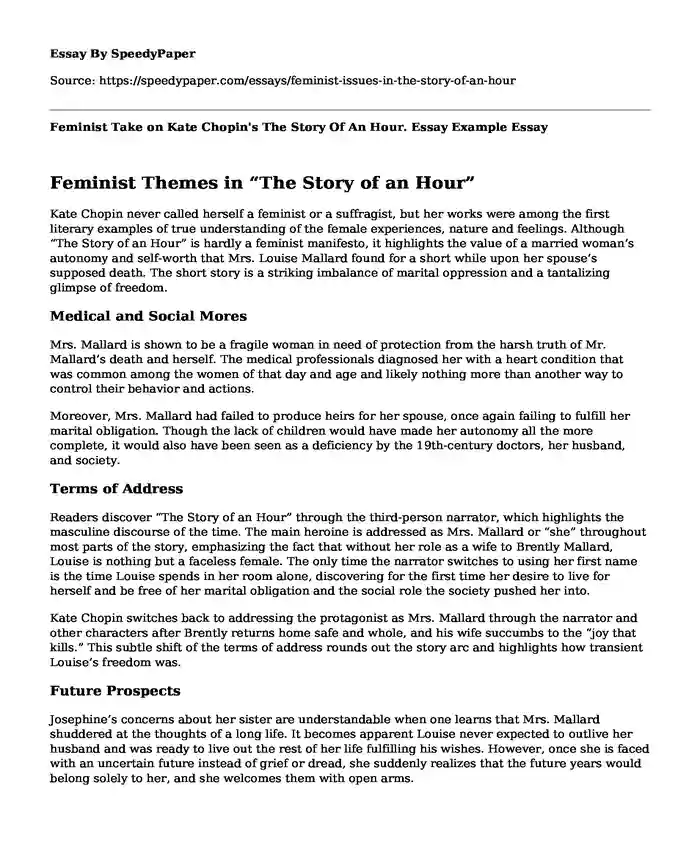
| Type of paper: | Essay |
| Categories: | Feminism Kate Chopin The Story of An Hour Gender in literature |
| Pages: | 4 |
| Wordcount: | 959 words |
Feminist Themes in “The Story of an Hour”
Kate Chopin never called herself a feminist or a suffragist, but her works were among the first literary examples of true understanding of the female experiences, nature and feelings. Although “The Story of an Hour” is hardly a feminist manifesto, it highlights the value of a married woman’s autonomy and self-worth that Mrs. Louise Mallard found for a short while upon her spouse’s supposed death. The short story is a striking imbalance of marital oppression and a tantalizing glimpse of freedom.
Medical and Social Mores
Mrs. Mallard is shown to be a fragile woman in need of protection from the harsh truth of Mr. Mallard’s death and herself. The medical professionals diagnosed her with a heart condition that was common among the women of that day and age and likely nothing more than another way to control their behavior and actions.
Moreover, Mrs. Mallard had failed to produce heirs for her spouse, once again failing to fulfill her marital obligation. Though the lack of children would have made her autonomy all the more complete, it would also have been seen as a deficiency by the 19th-century doctors, her husband, and society.
Terms of Address
Readers discover “The Story of an Hour” through the third-person narrator, which highlights the masculine discourse of the time. The main heroine is addressed as Mrs. Mallard or “she” throughout most parts of the story, emphasizing the fact that without her role as a wife to Brently Mallard, Louise is nothing but a faceless female. The only time the narrator switches to using her first name is the time Louise spends in her room alone, discovering for the first time her desire to live for herself and be free of her marital obligation and the social role the society pushed her into.
Kate Chopin switches back to addressing the protagonist as Mrs. Mallard through the narrator and other characters after Brently returns home safe and whole, and his wife succumbs to the “joy that kills.” This subtle shift of the terms of address rounds out the story arc and highlights how transient Louise’s freedom was.
Future Prospects
Josephine’s concerns about her sister are understandable when one learns that Mrs. Mallard shuddered at the thoughts of a long life. It becomes apparent Louise never expected to outlive her husband and was ready to live out the rest of her life fulfilling his wishes. However, once she is faced with an uncertain future instead of grief or dread, she suddenly realizes that the future years would belong solely to her, and she welcomes them with open arms.
Kate Chopin describes the change in Louise’s outlook from the outside in. First, the character notices the beauty of the world around her, and then her body responds to the new feelings elicited by the understanding of her new situation. Whereas she was initially weeping like a child at the news of her spouses’ demise, she felt warm and relaxed after her feelings had settled.
Finding Self
The single hour Louise spends alone in her room is the happiest time of her married life. She finds herself relishing the autonomy her spouse’s death brings. However, Mrs. Mallard is still mindful of the social expectations, so she keeps her joy quiet and barely whispers about being free in body and soul. She is also prepared to grieve over Brently’s body during the funeral.
However, her newfound energy cannot be contained, so when she goes back down to the bearers of grave news, her eyes and posture scream her true feelings. She seems victorious, a winner in the battle of spouses, the one to be left alive and alone, to do as she pleases. But, unfortunately, her victory is short-lived, as Mr. Mallard returns home without a scratch and shatters the visions of autonomy Louisa entertained for barely an hour.
Life in Oppression
Louisa’s victory is snatched away from her in true male fashion. Her husband’s return leads to her death, and the doctors establish it was the joy that killed the woman, as her weak heart could not handle the excitement of seeing her spouse alive.
Some see Louisa’s death as ultimate freedom. In the end, she escaped her husband’s will, even if she had to die for it. Others believe she could not exist in the same world as Mr. Mallard any longer, as his life translated into the death of her newfound self. Emily Toth suggests that Kate Chopin could not have written “The Story of an Hour” without Louisa dying at the end. No respected magazine would have published a short story with a happy ending for a woman who celebrated, albeit privately, her provider’s death. Therefore, Mrs. Mallard’s tragic death was inevitable.
However, all critics agree that Louisa’s married life was oppressive and stifling, an accepted norm for a 19th-century woman. She was expected to fulfill her spouse’s every desire without sparing a second thought for her wishes. In her tragic death, Mrs. Mallard managed to fail her husband one last time, leaving him to fend for himself until he found a new woman to take Louisa’s place and start the cycle again.
The juxtaposition of Mrs. Louisa Mallard’s long oppressive marriage and a short-lived victorious autonomy make “The Story of an Hour” a prime example of proto-feminist literature that drew attention to the gender inequalities long before diversity and equity were established on a legal level and became widely accepted.
Cite this page
Feminist Take on Kate Chopin's The Story Of An Hour. Essay Example. (2021, Dec 02). Retrieved from https://speedypaper.net/essays/feminist-issues-in-the-story-of-an-hour
Request Removal
If you are the original author of this essay and no longer wish to have it published on the SpeedyPaper website, please click below to request its removal:
Popular categories




